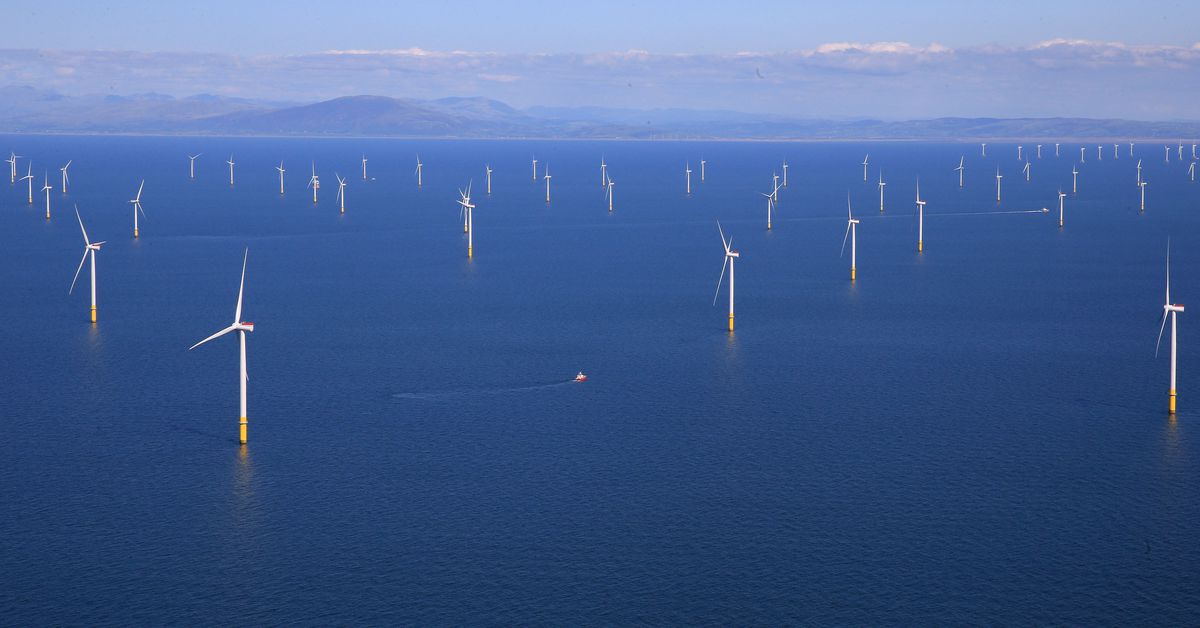OSLO, Sept 8 (Reuters) - Offshore wind developers stayed away from Britain’s latest renewable energy auction on Friday, arguing the price offered by the government did not reflect rising industry costs, something which is hampering wind projects globally.
The result was bad news for Britain’s 2050 net zero emissions target, which calls for 50 gigawatts (GW) of offshore wind capacity by 2030 versus around 14 GW now.
In a 2022 auction, offshore wind projects were the main recipient of funding, with 7 gigawatts (GW) awarded, but developers did not even bid in the latest auction, the results of which were published on Friday.
The UK’s Department for Energy Security and Net Zero said in a statement blamed the absence of awards for both offshore and floating offshore wind was a result of the global rise in inflation and the impact on supply chains.
The sector has seen huge cost increases, prompting developers worldwide to pull out of projects or seek to renegotiate them. Last week leading developer Orsted announced hefty impairments to U.S. projects.
Turbine makers are also struggling with quality issues as they scale up the technology, which is hitting earnings.
Energy and Climate Change Minister Graham Stuart said in a statement following the auction that the UK’s plans remain unchanged: “Offshore wind is central to our ambitions to decarbonise our electricity supply and our ambition to build 50GW of offshore wind capacity by 2030, including up to 5GW of floating wind, remains firm.”
Britain’s contract-for-difference (CfD) scheme, which was launched in 2014, offers renewable power developers a guaranteed price for their electricity.
However, it imposed a price cap for offshore wind bids of 44 pounds per megawatt hour (MWh), down from 46 pounds/MWh in the previous round.
“By capping the price the sector could bid at too low, government set it at a level that made it impossible for investors to meet their costs,” renewable energy campaign group Britain Remade said in a statement.
The lack of new offshore wind capacity would cost consumers 1 billion pounds a year, it added.
The government had offered 227 million pounds in subsidies to spur renewable power projects, increasing the amount in August after developers warned more funding was needed.
The auction news was an “energy security disaster”, Ed Miliband, shadow energy security and net zero secretary for the UK’s opposition Labour Party said in a statement.
“The Conservatives have now trashed the industry that was meant to be the crown jewels of the British energy system - blocking the cheap, clean, homegrown power we need,” he said.
The cost of offshore wind projects has risen by some 40%, developers such Germany’s RWE and Sweden’s Vattenfall have said, with the latter pausing development of a project that was awarded a CfD in last year’s round.
LESS CAPACITY
Awards across all renewable technologies which entered the latest auction totalled 3.7 gigawatts, down from 11 GW of projects getting contracts in last year’s round.
Solar power projects took the top spot with 1.9 GW of capacity, followed by onshore wind with 1.8 GW, the document showed.
The strike price for solar was 47 pounds ($58.71) per megawatt hour (MWh) in 2012 prices, up from 45.99 pounds in the previous round, with the onshore wind price rising to 52.29 pounds/MWh from 42.47 pounds.
Bid prices for renewable energy CfDs are expressed in 2012 money, with inflation meaning actual prices are higher.
The government noted Britain has shifted allocations to annual auctions, instead of every two years, offering developers more frequent opportunities to participate and allowing the government to amend conditions more quickly if needed.
($1 = 0.8005 pounds)



This represents a marked shift in the wind industry,which is struggling to make ends meet. This is bad for reaching our climate goals, but at the same time I can’t deny I feel vindicated against the 100% RE bros that kept saying for years how nuclear was simply irrelevant. This is what we’ve been saying and warning about. We’ll need nuclear energy, and probably pay a much higher price for solar and wind to make them work in the long run.